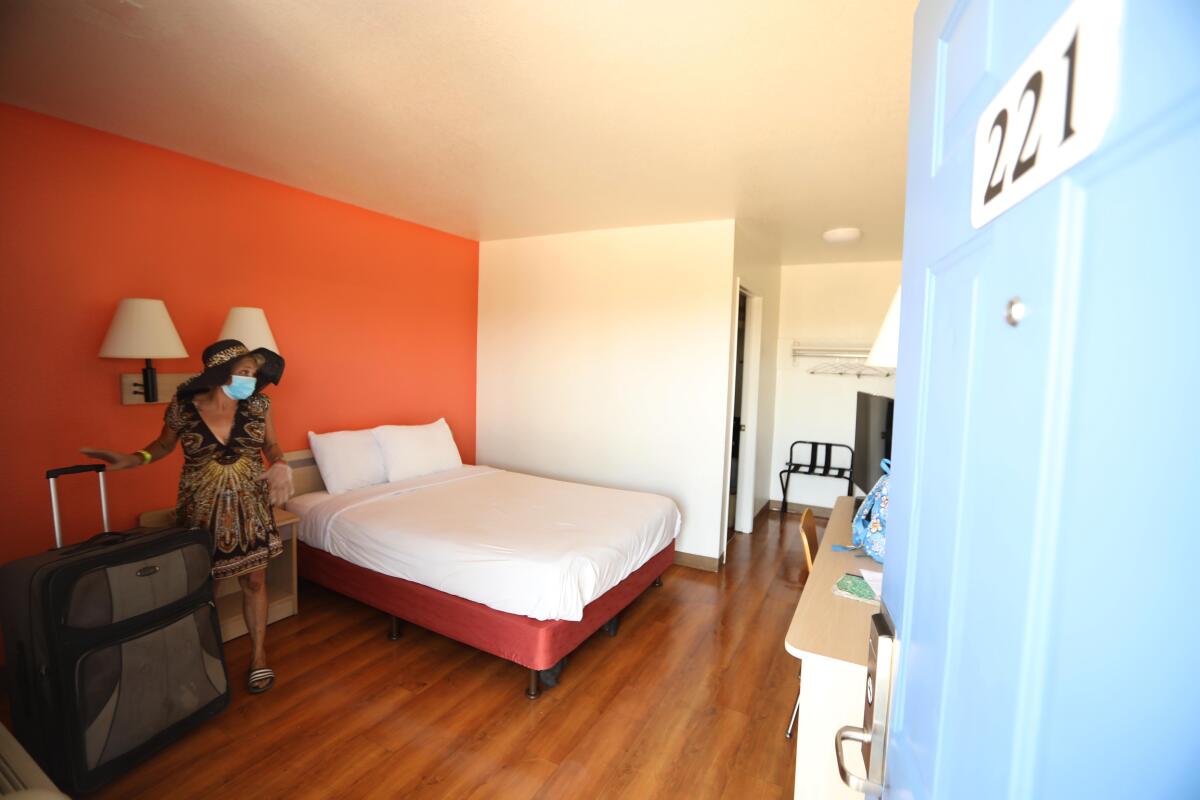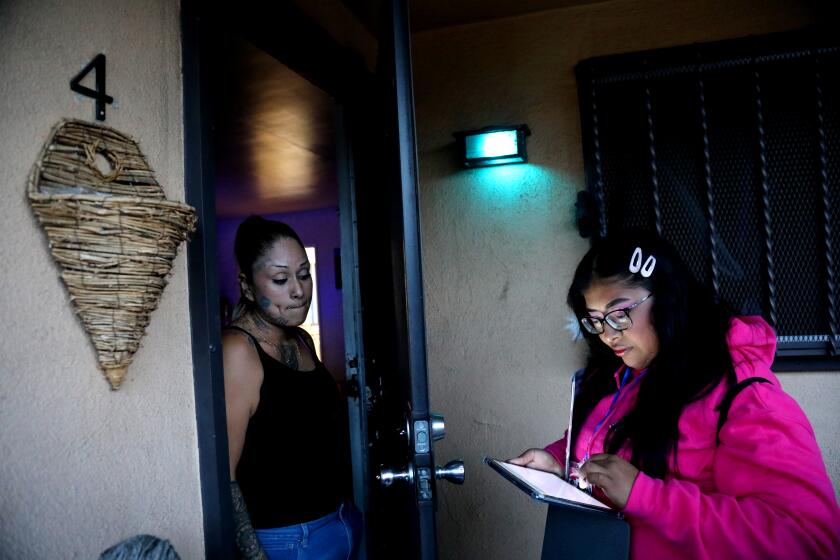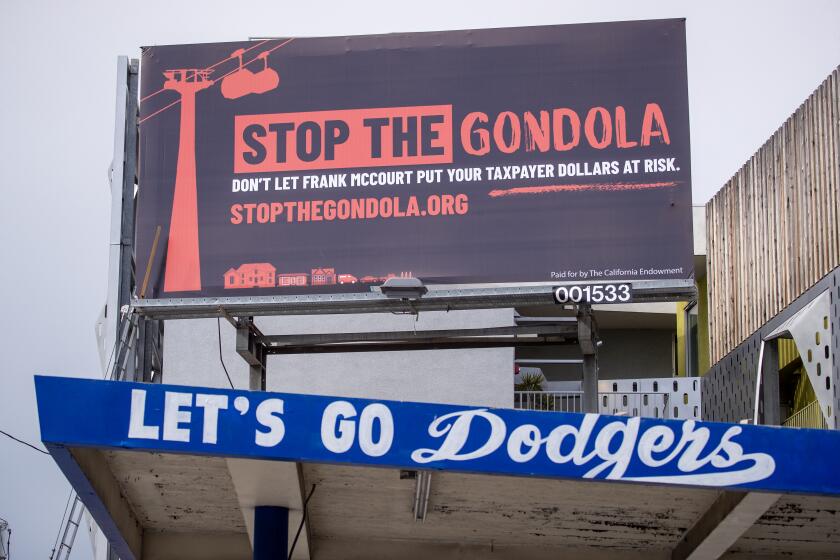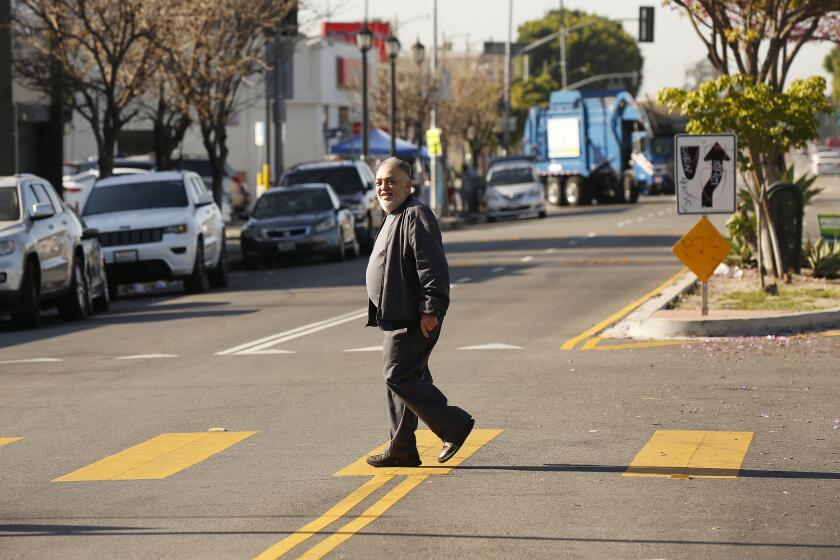Editorial: Why is the federal government refusing to pay L.A. $60 million for housing homeless people?

- Share via
When the pandemic began in early 2020, no one seemed more vulnerable than people without permanent shelter. At the time, public health experts warned that thousands of homeless people in California could be hospitalized or killed by the highly contagious novel coronavirus.
Project Roomkey was launched by state officials in April 2020 to protect homeless people considered high-risk — because they were over 65 or medically fragile — by moving them off the street and into empty motel and hotel rooms. This massive operation to provide safe shelter for tens of thousands of people would not have happened without a commitment by the Federal Emergency Management Agency to reimburse cities, counties and the state for the millions they spent on leases, food and service providers to run the hotels and motels.
But now, years later, the agency won’t pay all its promised share, stiffing state and local governments for millions of dollars they can’t afford to lose.
Rental subsidies, eviction defense and help finding new housing are prevention efforts that could help vulnerable people from falling into homelessness.
The initial reimbursement rate of 75% was increased in January 2021 by the Biden administration to 100% — and it was made retroactive.
Now as FEMA officials pore over reimbursement requests, they have decided to change the rules — long after Roomkey stopped operating. Though FEMA will reimburse rooms rented up to June 2021 for any length of stay, it will only reimburse for up to 20 days of a stay between June 11, 2021, and May 11, 2023.
This was news to city and state leaders who say they didn’t find out about the lower reimbursement rate until recently. “It was basically a change in policy in midstream after many of these programs had been running for over a year,” said Brian Ferguson, a spokesperson for the California Governor’s Office of Emergency Services.
That’s unconscionable. Cities and counties acted in good faith. Federal emergency officials ought to as well.
But Metro leaders are smart to attach conditions to ensure the project benefits the community and doesn’t suck up public money for private gain.
FEMA officials justified the change as simply aligning reimbursement levels with Centers for Disease Control and Prevention recommendations of 20 days for isolation and quarantine — and said local officials should have known that was always the basis for reimbursement.
The cutoff date was more random, based on the fact that by June 2021 California had lower prevalence of COVID and high vaccination rates.
However, Roomkey rooms weren’t intended for temporary isolation of homeless people with COVID, but as long-term shelter for those at high risk of contracting it and becoming seriously ill.
The stakes are very high. State and local governments could be on the hook for more than $300 million, according to state emergency services officials.
The city of Los Angeles could lose out on as much as $60 million — or one-third of what it was expecting from FEMA for Project Roomkey. That’s the estimated cost for stays of longer than 20 days in three city-run hotels after June 2021, according to Matt Szabo, the chief administrative officer for the city.
Some of L.A.’s most powerful interests are trying to sabotage a March 5 ballot measure aimed at making streets safer for pedestrians, bicyclists and even drivers.
The city of San Francisco may lose even more. According to the San Francisco city controller’s office, the city has submitted claims of $881 million to FEMA for reimbursement of COVID emergency expenses. An estimated $114 million of it could be disallowed under the 20-day rule.
Los Angeles County has less at stake — only about $1 million in Roomkey expenses after June 2021, according to a county official.
In Los Angeles County, 10,768 people stayed in a Roomkey room at some point between April 2020 and May 2023, according to officials with the Los Angeles Homeless Services Authority. Roomkey didn’t work perfectly for all of them. Some stayed only days, others for months. But for many the program was an important lifeline.
As of January there have been 389 deaths from COVID among the homeless population in Los Angeles County. But what would the death toll have been if L.A. County and cities, such as L.A., had to curtail their Project Roomkey operations after June 2021 because they were not sure if FEMA would reimburse?
California stepped up to temporarily house homeless people on a large scale to save them from a deadly virus. Now FEMA should fulfill its promise to fully reimburse the state’s Project Roomkey expenses.
More to Read
A cure for the common opinion
Get thought-provoking perspectives with our weekly newsletter.
You may occasionally receive promotional content from the Los Angeles Times.












